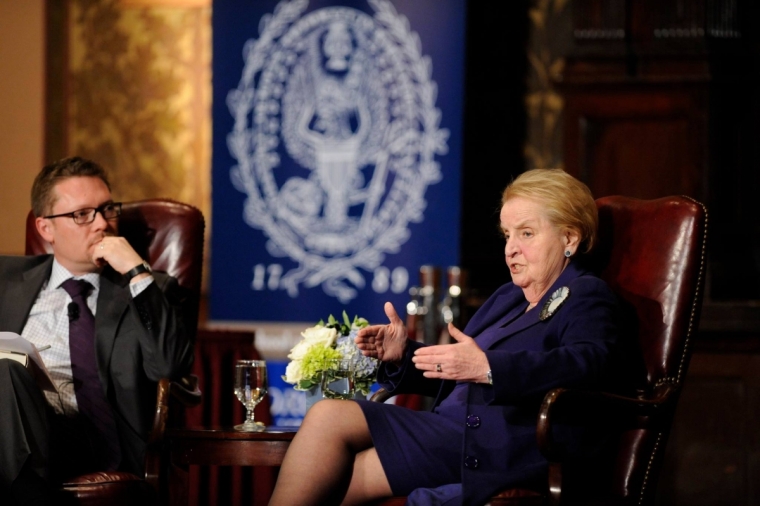Former Sec. of State Albright: Religion in foreign policy is like brain surgery, 'necessary ... but disastrous if you mess up'

WASHINGTON (Christian Examiner) – Former U.S. Secretary of State Madeline Albright has claimed western diplomats have erred over the past century when they've excluded religion from discussions on foreign policy.
"I was part of a generation that was taught to keep God and religion as separate as possible from foreign policy," Albright said in her address during the 10th anniversary celebration of Georgetown University's Berkley Center for Religion, Peace & World Affairs April 7.
"We took a narrow view. It's not so much that religion was forgotten. It was compartmentalized. It was personal, not public. Local, not global. We were not naïve, but neither did we accord religion as much weight as it deserved in the foreign policy discussion," Albright said.
There are some who might want to engage in such a bridge-building effort without bringing religion into the conversation — to them I say, 'Good luck.' ... As Desmond Tutu said, 'Religion is like a knife. It may be used to slice bread or stab your neighbor in the back. It cannot be ignored.'
Albright said the rise of Arab nationalism in the 1950s, pushed by secular leaders, associated religion with backwardness. Diplomats then came to see Cold War diplomacy in the Middle East solely as a "chess match" over which nation would influence Egypt, Iran and other countries. Religion faded from the discussion and led to gaps in knowledge about the foreign cultures the United States was engaging.
By the 1980s, however, it was clear that religion still very much influenced world affairs. Albright said radical Shia Islam in Iran and radical Sunni Islam rose in Afghanistan in the 1980s. Religion played a role in the Balkan crisis of the 1990s. It also plays a role today in the rise of the Islamic State and other radical groups.
Albright said it is hard for Americans to grasp the importance of religion in foreign policy because the country has such a long tradition of separation of church and state. Still, she said, Americans have "never separated religion from public life, and in today's world a president must take religion into account when they speak or act in world affairs. The question is how to do this without creating new problems."
She said considering the role of religion in foreign policy is like brain surgery – "necessary to do, but disastrous if you mess up."
Albright said the task diplomats now have is to "build bridges of understanding and tolerance before mutual ignorance and insecurity harden into an unbridgeable chasm of hate."
"There are some who might want to engage in such a bridge-building effort without bringing religion into the conversation — to them I say, 'Good luck,' " she said. "As Desmond Tutu said, 'Religion is like a knife. It may be used to slice bread or stab your neighbor in the back. It cannot be ignored.'"
With respect to terrorism, Albright claimed Americans should remember that they were not attacked on Sept. 11, 2001 by the Muslim world. She said the attacks were carried out by the "followers of a perverse ideology that uses Islam to justify terrorism." The attackers were not practicing their faith, but betraying it, she said.
Albright said the world's worst nightmare would be the continued expansion of sectarian conflicts to the point they could no longer be contained. She acknowledged, however, that conflicts over religion have happened repeatedly throughout history – especially in ancient times.
Albright was awarded the Presidential Medal of Freedom in 2012. She was secretary of state under President Bill Clinton and is the author of The Mighty and the Almighty: Reflections on America, God and World Affairs. Albright was born in Prague in 1937, two years before it was invaded by Nazi Germany. Her family fled to England and, later, to the U.S.